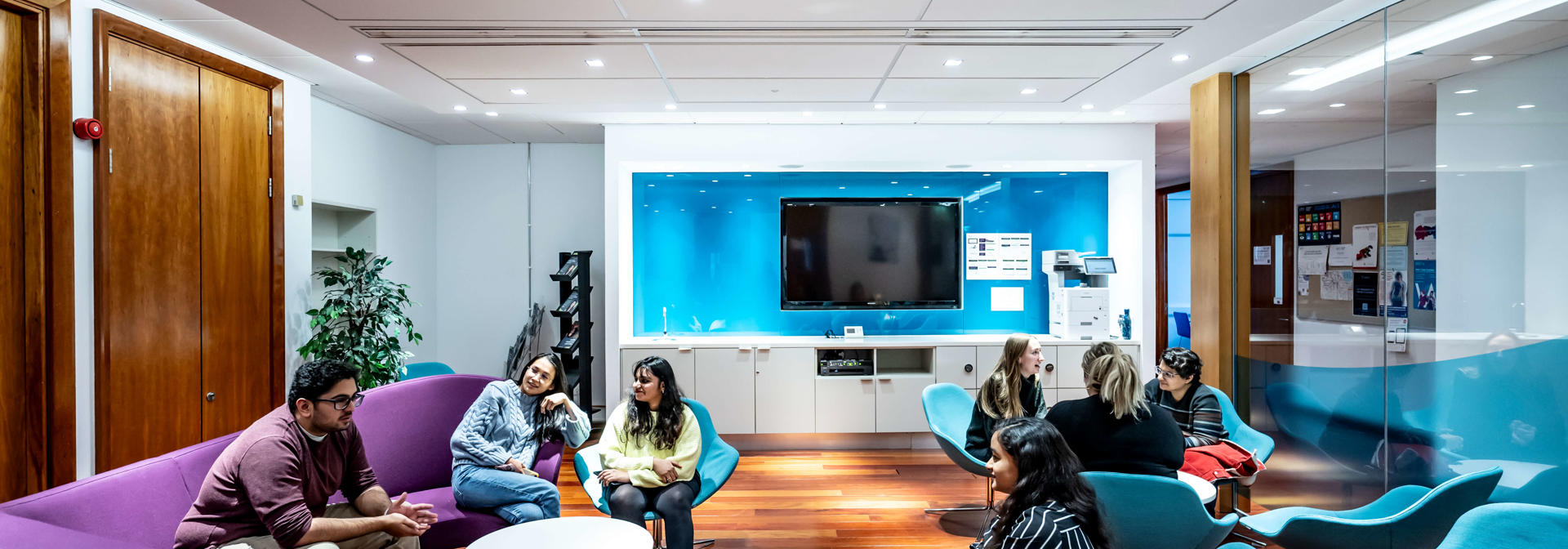Key information
Human resource management benefits employers, employees, and creates wider social benefits including lower unemployment, inclusion for marginalised people, reduced demand for out-of-work and in-work benefits while reducing healthcare burdens due to work-related illness and disability.
- Level
- Postgraduate Taught
- Delivery type
- Full Time, Part Time
- Degree qualification
- MSc
- Mode of delivery
- On-Campus
- Duration
- 1 year
- Location
- Edinburgh
- Start date
- September, January
- Next intake
- September
Our MSc Human Resource Management provides you with the crucial insights, skills, and knowledge to develop sustainable and socially responsible HR practices for managing people. You’ll gain a critical understanding of the core theories, principles and concepts that underpin contemporary organisation practice and explore socially responsible and sustainable models of human resource management (HRM). You’ll gain a critical awareness of the current and emerging issues in research and knowledge creation and gain the skills to develop original, creative solutions in response to these problems. The MSc will provide you with the skills to apply your knowledge and understanding to professional practice and solve contemporary organisational problems.
Beyond subject knowledge and skills, you’ll gain key transferrable skills which will aid you throughout your professional career. You’ll be able to make formal presentations about specialised topics to audiences with a variety of levels of expertise, effectively communicate using both written and verbal means to a range of audiences and undertake critical evaluations of a wide range of written, numerical and graphical data. This invaluable skillset will make you highly sought after upon graduation.
You’ll have the opportunity to specialise and choose an optional course – from team craft, managing diversity in business, and psychology of leadership – to customise your learning and develop your specific interest. Your human resource management dissertation will allow you to further build on these subject interests, by presenting you the opportunity to carry out an original research project at the forefront of knowledge. The knowledge base, subject and transferable skills you will gain will prepare you for lifelong learning and personal development.
You’ll focus on real-world problems and explore ways human resource management can help us address them. The career-focused master’s degree provides you with the practical knowledge and skills necessary for the workplace. You’ll explore a range of organisational contexts and practices which will set you up for a professional HR career.
The programme is accredited and approved by the Chartered Institute of Personnel and Development, which enhances career opportunities, networking, and events. Reflecting HRM's strategic role, the programme focuses on how HRM professionals can create a positive work environment, make informed decisions, and learn skills to be influential in an HR role at both strategic and operational levels.
The Future Shapers scholarship
The Future Shapers scholarship is looking for students who want to use research to create solutions to solve major global challenges. This has been established for 2026 by one of our generous donors and is a testament to the talent and world-shaping potential of our University's students and researchers. We are offering 12 scholarships across our 4 research areas, worth 50%, 75% and 100% of your tuition fee respectively.
Apply nowYour student experience
Your learning will be informed by the expertise of our research-active academics whose work covers four key areas:
- Employment, Work and the Professions
- Logistics and Sustainability
- Networks and Enterprise Excellence
- Social and Economic Data Analysis
Go Global
There are currently no Go Global opportunities for this particular programme. However, other Go Global opportunities may be available. Please contact studywithus@hw.ac.uk for more information.
Course content
September Intake - Edinburgh
Year 1
Mandatory September
- Digital Human Resource Management
- HR Strategy and Practice
- The Legal Context of Work
- Organisational Behaviour
Mandatory January
- Research Philosophy and Practice
- Employment Trends
- Sustainable HRM
Optional January
- Managing Diversity in Business
- Psychology of Leadership
Mandatory May
- Dissertation in HRM
January intake - Edinburgh
Year 1
Mandatory January
- Employment Trends
- Research Philosophy and Practice
- Sustainable HRM
Optional January
- Managing Diversity in Business
- Psychology of Leadership
Mandatory September
- Digital Human Resource Management
- The Legal Context of Work
- HR Strategy and Practice
- Organisational Behaviour
Mandatory second January
- Dissertation in HRM
Disclaimer
The courses mentioned above may change between now and the time that you study. For more information, please view our Terms and Conditions.
Student testimonials
The degree focuses on embedding practical knowledge, with modules assessed through real life case studies. The teaching staff were always willing to help and able to clear any doubts or concerns that I had. The programme equipped me with vital industry skills and I would highly recommend this degree programme at Heriot Watt University.
Fees and funding
| Status | Full Time | Part Time |
|---|---|---|
| UK | £12,744 | £6,372 |
| International | £24,952 | £12,476 |
- Status: Your residency status is usually defined as the country where you have been ordinarily resident for the three years before the start of your course.
- International: 'International' includes applicants from European Union countries who do not hold Pre-Settled or Settled status in UK. (This does not include students from the Republic of Ireland - see above).
Scholarships and bursaries
Postgraduate scholarships and bursaries
We aim to encourage well-qualified, ambitious students to study with us and we offer a wide variety of scholarships and bursaries to achieve this. Over £6 million worth of opportunities are available in fee and stipend scholarships, and more than 400 students benefit from this support.
Entry requirements
We have standard entry requirements for all of our courses that you will have to meet.
Year 1
A minimum of honours degree at 2:2 or non-UK equivalent in a related subject. Suitable degrees often include Business, Economics, Psychology, Sociology or other Social Sciences degree. Non-relevant degrees with evidence of essay writing or critical thinking will also be considered, in conjunction with 2+ years of work experience in HRM.
We welcome applications from international students and accept qualifications from around the world. Please refer to the entry requirements for your country for more details.
English language requirements
If your first language is not English, we'll need to see evidence of your English language ability.
The minimum English language requirement for entry to this programme is IELTS 6.0 (or equivalent) with no score lower than 5.5 except for writing which must be at 6.0 minimum.
If you do not have IELTS 6.0, we offer a range of English language courses to help you meet the English language requirement for this programme prior to commencing your studies.
Please see our detailed English language requirements.
Why Heriot-Watt
We're the top university in Scotland for graduate outcomes which means that more of our graduates are employed or in postgraduate education than any other institution in the country and we ranked 5th in the UK.
We're also rated number one in the UK for CEO or MD roles, meaning more of our graduates go on to become CEOs or MDs than any other university in the whole of the UK. On top of that, we have beautiful campuses, across the globe, so you'll get a truly international education. Our Edinburgh Campus is home to Oriam, Scotland's National Sports Performance Centre combined with plenty of wellbeing resources, prioritising fitness and mental health for all students. Our Global Research Institutes look at solving real world issues such as climate change and saving our oceans as well as working on the next medical technological breakthrough and the future of AI and robots.
Student life
Explore facilities, and chat to staff and students






